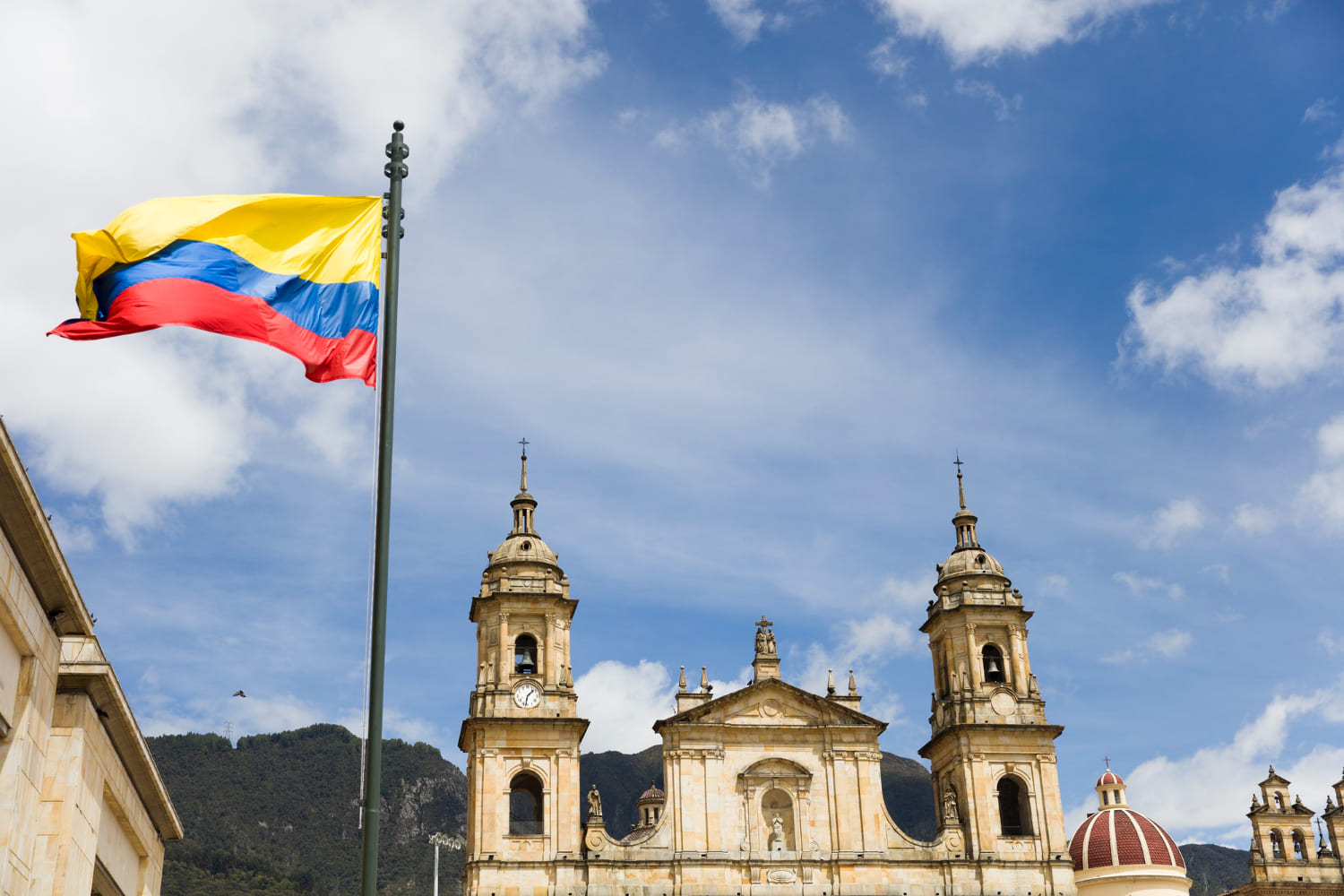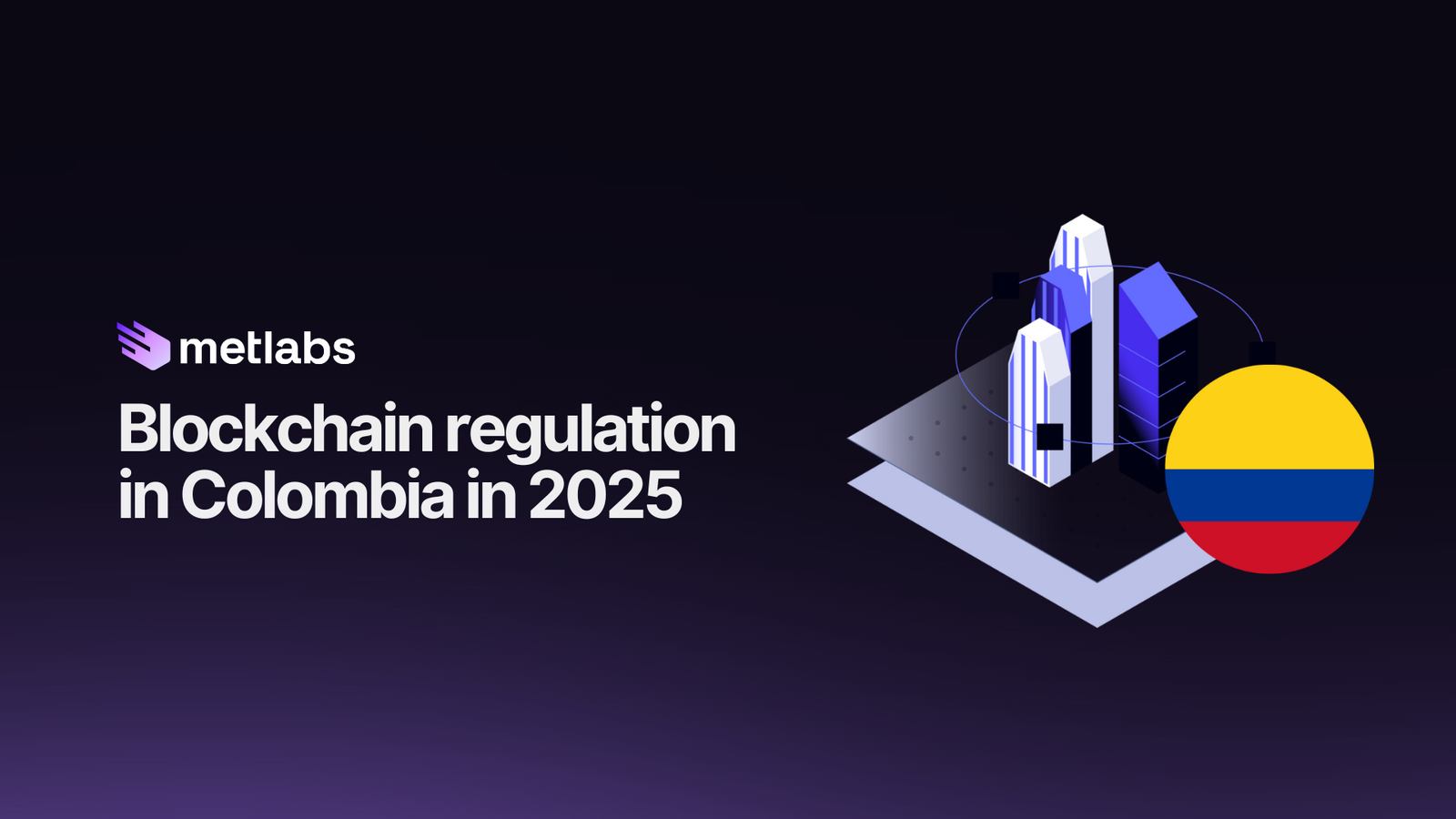The adoption of blockchain technology and asset tokenization is advancing at a rapid pace, but the real engine driving its global development is the existence of a clear, consistent and innovation-friendly legal framework.
Some countries have already established themselves as regulatory benchmarks, establishing specific rules for cryptoassets, DLT infrastructures and token issuance with legal backing. In this article we show you relevant information about blockchain regulation in Colombia, which you can use as a guide if you are looking to operate internationally or evaluate different strategic locations.

Current legislation on blockchain and virtual assets in Colombia
Securities Market Law Colombia (Decree 2555/2010)
This framework regulates the issuance and offering of securities in Colombia. The Superintendencia Financiera (SFC) considers that tokens representing securities must comply with this law. Therefore, their issuance, marketing and trading require prior authorization from the SFC and must comply with the rules of transparency, registration and investor protection.
AML/CFT Regulations (UIAF and SFC)
Crypto-asset activities are subject to regulations on the prevention of money laundering and terrorist financing. The Financial Information and Analysis Unit (UIAF) and the SFC require ecosystem players to implement KYC controls, transaction monitoring and suspicious transaction reporting, in line with FATF/FATF standards.
Regulatory sandbox of the Superintendencia Financiera
Since 2021, Colombia has had a regulatory Sandbox where authorized financial entities and exchanges collaborate to operate with cryptoassets in a controlled environment. Supervised by the SFC, this space allows the development of innovative business models, providing regulatory expertise on digital assets and blockchain-based solutions.
Virtual Assets Bill (under discussion)
A bill is currently being debated in Congress that seeks to create a comprehensive framework for the regulation of virtual assets and service providers (PSAVs). The initiative raises requirements for registration, supervision and consumer protection rules, and is expected to bring greater legal certainty to the blockchain ecosystem in Colombia.
Tokenization makes it possible to digitally represent real-world assets through blockchain, but for it to have legal value, it is essential that there is a regulatory framework that recognizes this operation. Colombia adopts its own approach, establishing specific rules for the issuance, custody or trading of tokens. In this block we explain how asset tokenization is regulated from a legal point of view, taking an advanced jurisdiction such as Colombia as an example.
Regulation of asset tokenization in Colombia
The regulation of asset tokenization in Colombia is at an early and evolving stage. Tokens representing transferable securities (shares, debt, fund shares) are subject to Decree 2555/2010 and to the supervision of the SFC. Their issuance and commercialization require authorization, and the platforms that trade them must operate under a PSAV license, complying with prudential and transparency requirements.
For non-financial assets (such as real estate, commodities or intellectual property rights), there is no specific legal framework, but the issuance of these tokens is governed by civil and commercial law. In addition, the actors involved must comply with AML/CFT rules and register as a PSAV where applicable. Blockchain registries, although not expressly recognized under current law, are contractually accepted and can support rights based on their integration with the legal system.
The SFC regulatory sandbox has advanced the understanding and oversight of tokenization models in controlled environments, and several pilots have explored the tokenization of real assets. As the legislative discussion progresses, it is expected that a more robust framework will be created to facilitate innovation in tokenization, providing greater legal certainty for investors and institutions interested in the development of these markets.
Regulatory agencies and authorities for digital assets in Colombia
Financial Superintendency of Colombia (SFC)
The Financial Superintendency of Colombia is the authority in charge of regulating and supervising activities related to digital assets when they qualify as securities or financial products. It coordinates the regulatory sandbox for fintech and blockchain projects, supervises the issuance and marketing of security tokens, and defines the applicable prudential requirements.
Financial Information and Analysis Unit (UIAF)
The UIAF is the entity responsible for the prevention of money laundering and terrorist financing (AML/CFT). It supervises that crypto-asset activities comply with AML/CFT regulations in force. It receives suspicious transaction reports, issues guidelines for PSAVs and collaborates with the SFC in the supervision of the virtual asset sector.
National Tax and Customs Directorate (DIAN)
The DIAN establishes the tax framework applicable to crypto-asset transactions. It defines the criteria for the taxation of income and gains derived from these activities, and requires their proper declaration by taxpayers. It also collaborates with the UIAF and the SFC to improve tax transparency in the crypto ecosystem.
Launching a business based on digital assets requires more than just technology: it is also necessary to comply with legal requirements such as licensing, registration and regulatory obligations. These conditions ensure that the business model is viable and sustainable over time, and that it complies with transparency and fraud prevention standards. In this section we explore what licenses are usually required and what compliance criteria blockchain companies operating in Colombia must follow.

What licenses and requirements are needed to operate with cryptoassets in Colombia?
Bill 510/2025 on virtual assets and PSAV registration
Bill 510/2025, which seeks to create a comprehensive framework to regulate PSAV/VASPs, including the creation of a mandatory registry, supervised by the Superintendency of Companies, and new rules on transparency, user protection and AML/CFT, is under discussion in Congress. This project, although not enacted, is key to understand the imminent evolution of the Colombian regulatory framework.
Participation in the regulatory sandbox of the SFC
The operation of projects related to digital assets in Colombia is carried out mainly through the SFC’s regulatory Sandbox. Participating entities must comply with prior authorization requirements, operational structure, consumer protection rules and AML/CFT controls. Participation is mandatory to operate in the pilot phase and validate business models.
SFC Authorization for Securities Tokens
Tokens representing securities are subject to prior authorization by the SFC, in compliance with Decree 2555/2010. Issuers and trading platforms must comply with prudential requirements, public offering rules and investor protection established in current legislation.
AML/CFT compliance
All actors must comply with obligations to prevent money laundering and terrorist financing. This includes implementing KYC procedures, monitoring transactions, identifying beneficial owners and reporting suspicious activities to the UIAF. AML/CFT compliance is essential to operate legally in the country.
Are you exploring developing your blockchain project in Colombia?
At Metlabs we help companies like yours and offer comprehensive support in the development of blockchain projects and tokenization of assets such as real estate, carbon credits, commodities, intellectual property, financial instruments, franchises and more, fully aligned with blockchain regulation in Colombia and international regulatory standards.
Contact us and find out how we can help you meeting all your business model needs, from technical validation and structuring to design, development and implementation of custom blockchain solutions, ready to scale from day one.



